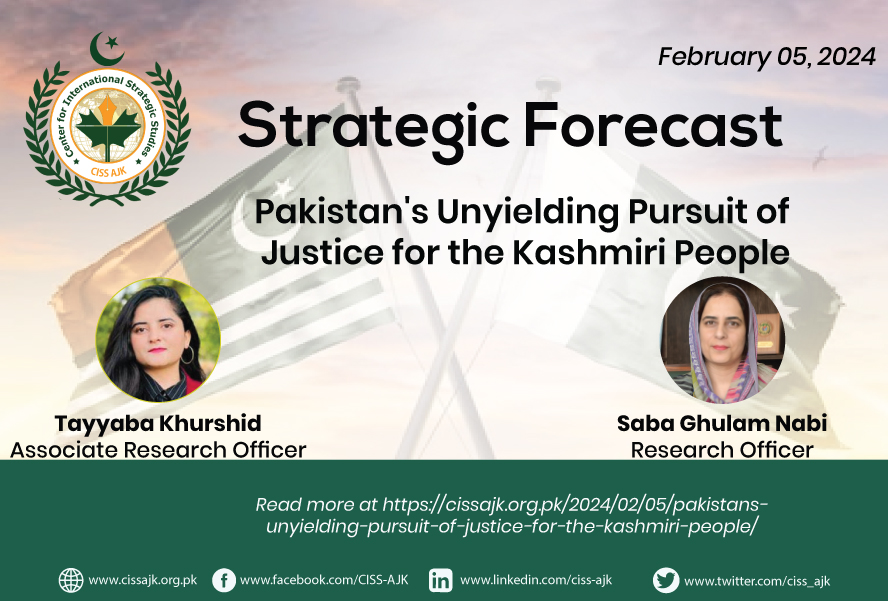As the world grapples with complex geopolitical issues, one enduring struggle has persisted for decades that remained the main cause of disagreement between two South Asian Nuclear Rivals. The 5th of February is observed as Kashmir Solidarity Day in Pakistan, an occasion that underscores the commitment of the nation to stand by the Kashmiri people in their quest for justice and self-determination.
The roots of the Kashmir dispute trace back to the subcontinent’s partition in 1947, when India incorporated the Muslim-majority state of Jammu and Kashmir against the agreed-upon plan. In response, Pakistan condemned this act and offered support to the Kashmiri people. The liberation of Azad Jammu and Kashmir (AJK) on October 24, 1947, marked a pivotal moment, where Pakistan remained firm to its legal position on Kashmir advocating the implementation of UNSC resolutions on Kashmir that call for a free and fair plebiscite after these years.
The Karachi Agreement of 1949 solidified Pakistan’s commitment to resolving and internationalizing the Kashmir issue. Pakistan undertook responsibilities, vowing to raise its voice on both national and international forums to address the long-standing dispute. Over the years, Pakistan has explored diplomatic channels , sparing no effort to alleviate the suffering of the Kashmiri people and provide them the opportunity to determine their future peacefully.
Despite these persistent efforts, India has consistently denied the basic rights of the Kashmiris, resisting any inclination to allow them a voice in shaping their destiny. The region has witnessed three wars between India and Pakistan, along with numerous Line of Control (LOC) violations by Indian side, underscoring the gravity of the situation.
The official observance of Kashmir Solidarity Day dates back to 1975 during the regime of Prime Minister Zulfiqar Ali Bhutto, who, in the face of political unrest in Indian Illegally Occupied Jammu and Kashmir (IIOJK), chose to express solidarity with the Kashmiri people. Since then, the socio-political landscape in IIOJK has undergone various transformations, with Pakistan consistently standing united with the Kashmiri people during times of unrest, such as after the rigged elections of 1987.
The suggestion to officially observe Kashmir Solidarity Day on the 5th of February was put forth in 1990 by Qazi Hussain Ahmed, Chairman of the Jamaat-e-Islami, along with opposition leader Nawaz Sharif. Prime Minister Benazir Bhutto swiftly endorsed the idea, and the tradition of observing the day began in earnest in 2004 when Prime Minister Mir Zafar Ullah Khan Jamali officially declared the celebrations.
During these years, Pakistan has advocated the implementation of UNSC resolutions in various national and International platforms like UN General Assembly sessions. Pakistani Diaspora also works with Kashmiri Diaspora to highlight the Kashmir cause through various forums like Jammu and Kashmir Self Determination Movement International (JKSDMI). When India unilaterally changed the status of IIOJK in 2019 by revoking article 370 and 35A, Pakistan in solidarity with Kashmiris, not only condemned the act of India but took some visible practical actions. National Security Committee of Pakistan decided to downgrade the diplomatic ties with India and Pakistan High Commissioner to India was recalled and Indian High Commissioner to Pakistan was expelled. The train services like Samjhauta Express and Thar Express was also suspended. The Ministry of Information and Broadcasting decided to ban the screening of Indian films and dramas inside Pakistan. On 9th of August, Pakistan formally suspended a large part of its trade relations with India and banned all exports and imports to and from India. In 2023, the supreme court of India in a political move upheld the Indian illegal move of 2019, which was also condemned by Pakistan. The Ministry of Foreign Affairs in response to decision stated “Pakistan categorically rejects the judgement announced by the Supreme Court of India on the status of Indian Illegally Occupied Jammu and Kashmir (IIOJK)…… India’s unilateral and illegal measures since 5 August 2019 have been aimed at changing the demographic structure and political landscape of the IIOJK, in flagrant violation of international law and the relevant UN Security Council Resolutions, especially Resolution 122 (1957). They remain a matter of grave concern for Pakistan as their ultimate goal is to convert the Kashmiris into a disempowered community in their own land. These measures must be rescinded to create an environment for peace and dialogue.” Pakistan has used all the available means to project Kashmir issue internationally and severed its diplomatic ties with India in solidarity with Kashmiri people and in recognition of its position as a party to dispute. However, India aims to unilaterally yet illegally decide the future of Kashmir that is not acceptable for Kashmiri people and Pakistan.
In a nutshell, Kashmir Solidarity Day is more than a mere symbolic gesture; it is a solemn commitment to justice, a testament to Pakistan’s enduring support for the Kashmir cause. In the face of the complex challenges posed by the Kashmir dispute, the international community must acknowledge the human rights violations occurring in the region and advocate for a peaceful resolution. The observance of Kashmir Solidarity Day is not just a ritual; it is a call for justice, an expression of solidarity that transcends borders and underscores the urgency of addressing the longstanding grievances of the Kashmiri people. The historical context, coupled with the contemporary realities, calls for a reinvigorated commitment to justice, human rights, and the aspirations of the Kashmiri people. Only through sincere dialogue, collaboration, and a genuine acknowledgment of the rights of the Kashmiris can we hope to pave the way for a brighter and more stable future for the region.

